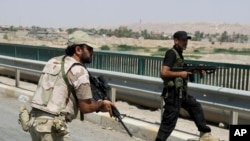Iraqi officials said their forces have ended a siege by Islamic militants on the northern town of Amerli, where thousands of people have been trapped for over two months with dwindling food, water and medical supplies.
Lieutenant General Qassim al-Moussawi said that Iraqi forces along with Shi'ite militiamen entered the town around midday Sunday.
"The Iraqi troops were able to enter the town of Amerli," Moussawi said. "And the military operations of clearing villages around Amerli are still going on. The battles are still continuing as our forces are advancing forward."
The battle was hailed as a huge strategic victory for the Iraqi security forces and the militia fighters who joined them after a summer that saw the Islamic State lead other Sunni armed groups in seizing almost one-third of the country's territory.
Military spokesman Qassim al-Atta described Amerli as a launching pad to retake the northern province of Salahuddin, including its capital, which was captured by Islamic State militants in June.
Airstrikes, aid drop
The U.S. Defense Department said the United States conducted airstrikes Saturday against the Islamic State militants around Amerli and dropped humanitarian aid to those trapped in the town.
Pentagon Press Secretary Rear Admiral John Kirby said in a statement the U.S. Air Force delivered the aid alongside aircraft from Australia, France and Britain.
Kirby said the U.S. military conducted coordinated airstrikes against nearby Islamic State terrorists to support the humanitarian assistance operation.
In other developments Sunday, two suicide bombers detonated vehicles rigged with explosives near security positions in the western city of Ramadi, killing at least 13 people.
Australia said it is joining the international effort to supply weapons to the Kurdish forces fighting the Islamic State militants.
Australian Prime Minister Tony Abbott said Sunday the situation in Iraq is a "humanitarian catastrophe."
He said Australia will continue to work with international partners to "address the security threat" posed by the militants.
NATO summit
U.S. Secretary of State John Kerry said Washington will use a NATO summit later this week to push for a coalition of countries to fight the Sunni extremists.
Kerry, writing in the New York Times on Saturday, called the Islamic State militancy a "cancer," and he vowed "it will not be allowed to spread to other countries."
Meanwhile, U.S. Senate Intelligence Committee Chair Dianne Feinstein suggested President Barack Obama is moving too slowly in developing a strategy to combat Islamic State.
"I've learned one thing about this president, and that is he is very cautious. Maybe, in this instance, too cautious," Feinstein said on NBC's Meet the Press.
Feinstein said the U.S. should work with other countries threatened by the militants.
"Hopefully those plans will coalesce into a strategy that will encourage that coalition from Arab nations - you know, Jordan's at jeopardy, Lebanon's at jeopardy, the UAE and other countries are in jeopardy," Feinstein said. "So there is good reason for people to come together now and begin to approach this as the very real threat that it in fact is."
Saudi response
Separately, in comments published early Saturday, Saudi King Abdullah warned that Islamic State extremists could target Europe and the United States, if the West fails to agree on a strong response to the militancy.
Official Saudi media quoted the king as saying the "terrorists do not know the name of humanity, and you have witnessed them severing heads and giving them to children to walk with in the street."
Public outrage over the beheading of an American journalist and several mass executions claimed by militants in nearby Syria has led President Obama to consider strikes on militant targets in eastern Syria.
Kerry said he and Defense Secretary Chuck Hagel will seek support at the September 5 NATO summit in Wales for "the broadest possible assistance" in acting against the militancy.
The two Americans then will visit Middle East capitals to solidify support from countries directly threatened by the extremist movement.
German jihadists
Elsewhere, Germany's domestic intelligence chief said Sunday young Muslims are attracted to the Islamic fighters in Iraq and Syria because of the group's brutality, radicalism and rigor.
Hans-Georg Maassen told Deutschlandfunk radio at least 400 Germans have joined the Islamic fighters and there is evidence at least five have carried out suicide attacks for the insurgents.
Sunday the German government is to decide whether to send military aid to the Kurdish forces fighting the Islamic State forces in Iraq.
Some information for this report comes from AP, AFP and Reuters.














